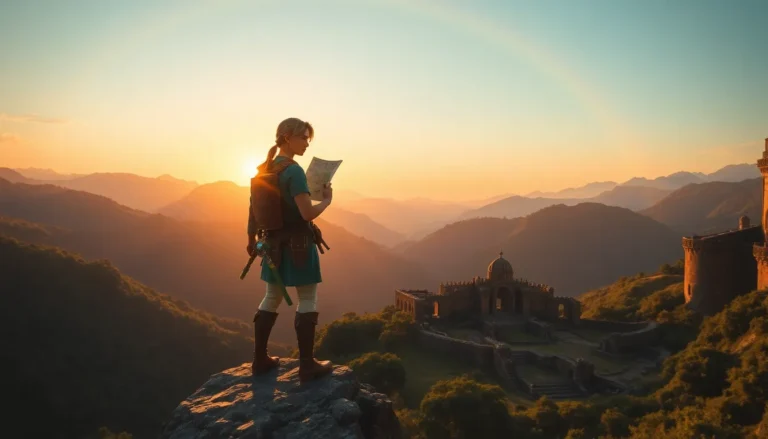Table of Contents
ToggleIn the vast kingdom of Hyrule, a legendary debate rages on: which Zelda game reigns supreme? Gamers have wielded their swords and shields, traversed dungeons, and solved countless puzzles, all in the name of this beloved franchise. But with so many iconic titles, it’s no wonder fans find themselves in an epic showdown over which game deserves the crown.
From the pixelated charm of the NES original to the breathtaking landscapes of Breath of the Wild, each installment offers its own unique magic. But let’s face it—some games are like the Master Sword, while others might just be a rusty old dagger. Join the quest as we delve into the enchanting world of Zelda and uncover which game truly deserves the title of best. Spoiler alert: it’s not just about nostalgia; it’s about adventure, innovation, and maybe a little bit of that classic Zelda humor.
Overview of The Legend of Zelda Series
The Legend of Zelda series began in 1986, captivating gamers with its rich storytelling and innovative gameplay. Nintendo’s creation features a hero named Link, who embarks on quests to rescue Princess Zelda and thwart villainous plots, primarily driven by Ganon. Each game introduces new mechanics, expanding the franchise’s universe and keeping fans engaged.
Exploration constitutes a core element of gameplay. Players navigate vast worlds filled with dungeons, puzzles, and treasures. The original title introduced a groundbreaking non-linear approach, allowing freedom in quest progression. Subsequent titles, like The Legend of Zelda: Ocarina of Time and The Legend of Zelda: Breath of the Wild, further refined exploration through 3D graphics and expansive environments.
Graphics and sound also evolved significantly across the series. Early titles featured simple 8-bit graphics while more recent entries showcased stunning visuals and orchestral soundtracks. The art style varies, with cel-shaded visuals in The Legend of Zelda: The Wind Waker contrasting against the gritty design in Twilight Princess.
Combat mechanics transitioned from basic swordplay in early games to more complex systems that include abilities and items. The introduction of abilities like parrying and elemental arrows in Breath of the Wild exemplifies this evolution. Players encounter unique enemies, each requiring specific strategies for defeat.
Innovative gameplay remains a hallmark of the series. Titles like The Legend of Zelda: Link’s Awakening and The Legend of Zelda: Majora’s Mask offered unique narratives and mechanics, enhancing player engagement. The blend of action-adventure elements with RPG aspects creates vibrant, memorable experiences.
The Legend of Zelda series maintains cultural significance and has influenced countless other games. Recognized for its creativity and immersive worlds, it continues to attract new players while retaining dedicated fans. Each title stands as a testament to Nintendo’s commitment to quality and innovation.
Criteria for Evaluating Zelda Games
Evaluating the best Zelda game involves several key criteria that highlight each title’s strengths.
Gameplay Mechanics
Innovative gameplay mechanics significantly define player experience. Exploration is essential, with many games encouraging players to traverse vast landscapes. Puzzles add depth, challenging players with various obstacles. Combat systems have evolved, featuring unique skills tailored to enemy types. Each entry introduces new abilities that enhance gameplay, from traditional swordplay to magic and stealth. Collecting items, upgrading gear, and solving environmental challenges further enrich the mechanics, keeping gameplay fresh and engaging.
Story and Narrative
Story and narrative establish emotional connections with players. Each game introduces compelling characters, especially Link and Zelda, intricately woven into the plot. The overarching conflict between good and evil provides a thrilling backdrop. Unique storylines, such as the time travel in Ocarina of Time and the dreamlike elements in Link’s Awakening, enhance player immersion. Important themes, like friendship and courage, resonate throughout the franchise, promoting a robust storyline that complements each adventure.
Graphics and Art Style
Graphics and art style play a crucial role in each game’s appeal. Early titles feature simple 8-bit visuals, while modern entries exhibit breathtaking 3D environments. Artistic choices reflect the game’s tone, with vibrant colors in Wind Waker contrasting darker aesthetics in Twilight Princess. Each entry’s visual design erases boundaries, captivating players with detailed worlds and imaginative character designs. Advances in technology have bolstered the franchise, allowing for richly animated cutscenes and immersive environments that draw players deeper into Hyrule.
Top Contenders for The Best Zelda Game
The debate around the best Zelda game features iconic titles that shaped the franchise significantly. Fans often highlight key games that deliver unique experiences.
The Legend of Zelda: Ocarina of Time
Released in 1998, Ocarina of Time revolutionized 3D action-adventure gaming. The game introduced Z-targeting, enhancing combat and puzzle-solving mechanics. A rich storyline, featuring time travel and compelling characters, captivated players. Its vast world of Hyrule provided immersive exploration, setting new standards in game design. Players recall the emotional weight of the music, particularly the iconic ocarina melodies. Ocarina of Time often receives accolades for its polished gameplay and enduring influence on future titles.
The Legend of Zelda: Breath of the Wild
Breath of the Wild, launched in 2017, broke conventions with its open-world format. Exploration encourages players to discover secrets and approach challenges creatively. The physics engine allows for dynamic interactions, fostering unique gameplay experiences. Its visually stunning landscapes captivate players, making Hyrule feel alive and expansive. Encounters with various enemies require strategy and adaptability, contributing to the overall engagement. Many consider Breath of the Wild a masterpiece for redefining the franchise and setting a new standard in open-world gaming.
The Legend of Zelda: A Link to the Past
Released in 1991, A Link to the Past is a beloved classic known for its compelling narrative and gameplay depth. Players navigate both the Light and Dark Worlds, solving intricate puzzles that interconnect the two realms. The introduction of items like the Master Sword and hooks adds to the strategic elements of combat. A strong storyline, along with memorable characters like Princess Zelda and Ganon, engages players emotionally. Unique mechanics and engaging dungeons continue to influence the series, solidifying its place in gaming history.
Community Opinions and Polls
Gamers frequently share their preferences through various online forums and polls, showcasing varying opinions on the best Zelda game. Nintendo’s official sites often host surveys, revealing consistent trends. For instance, a poll on Reddit indicates strong support for Ocarina of Time due to its groundbreaking mechanics and engaging narrative. In contrast, Breath of the Wild garnered attention for its expansive open-world design and freedom of exploration.
Social media platforms also serve as hubs for discussion. Twitter users regularly post their favorite titles using hashtags, creating a vibrant dialogue around game preferences. Facebook groups dedicated to Zelda fans provide dedicated spaces for in-depth conversations about gameplay experiences and nostalgic moments.
User reviews on gaming websites reflect personal insights. Many players cite the emotional connections formed with characters as a key factor influencing their choices. Others emphasize unique mechanics, like Majora’s Mask’s time management feature or Link’s Awakening’s dreamlike narrative.
Recent polls conducted on gaming community websites have produced intriguing results. About 40% of respondents favor Breath of the Wild, applauding its innovation, while 30% prefer Ocarina of Time, noting its historical significance. A Link to the Past holds about 20% of the votes due to its classic gameplay and story depth.
The diversity in opinions highlights that each title offers something distinct, catering to different player preferences. Exploring these community sentiments provides valuable insights into why certain games resonate more deeply than others within the iconic franchise.
Conclusion
The debate over which Zelda game reigns supreme showcases the franchise’s incredible diversity and innovation. Each title brings unique experiences that resonate differently with players. Whether it’s the groundbreaking mechanics of Ocarina of Time or the expansive freedom found in Breath of the Wild, every game has left an indelible mark on the gaming landscape.
The vibrant discussions among fans highlight the emotional connections forged through gameplay and storytelling. As new titles continue to emerge, the legacy of The Legend of Zelda remains strong. Ultimately, the best Zelda game is a personal choice shaped by individual experiences and preferences, ensuring that the quest for the ultimate title will persist for years to come.




